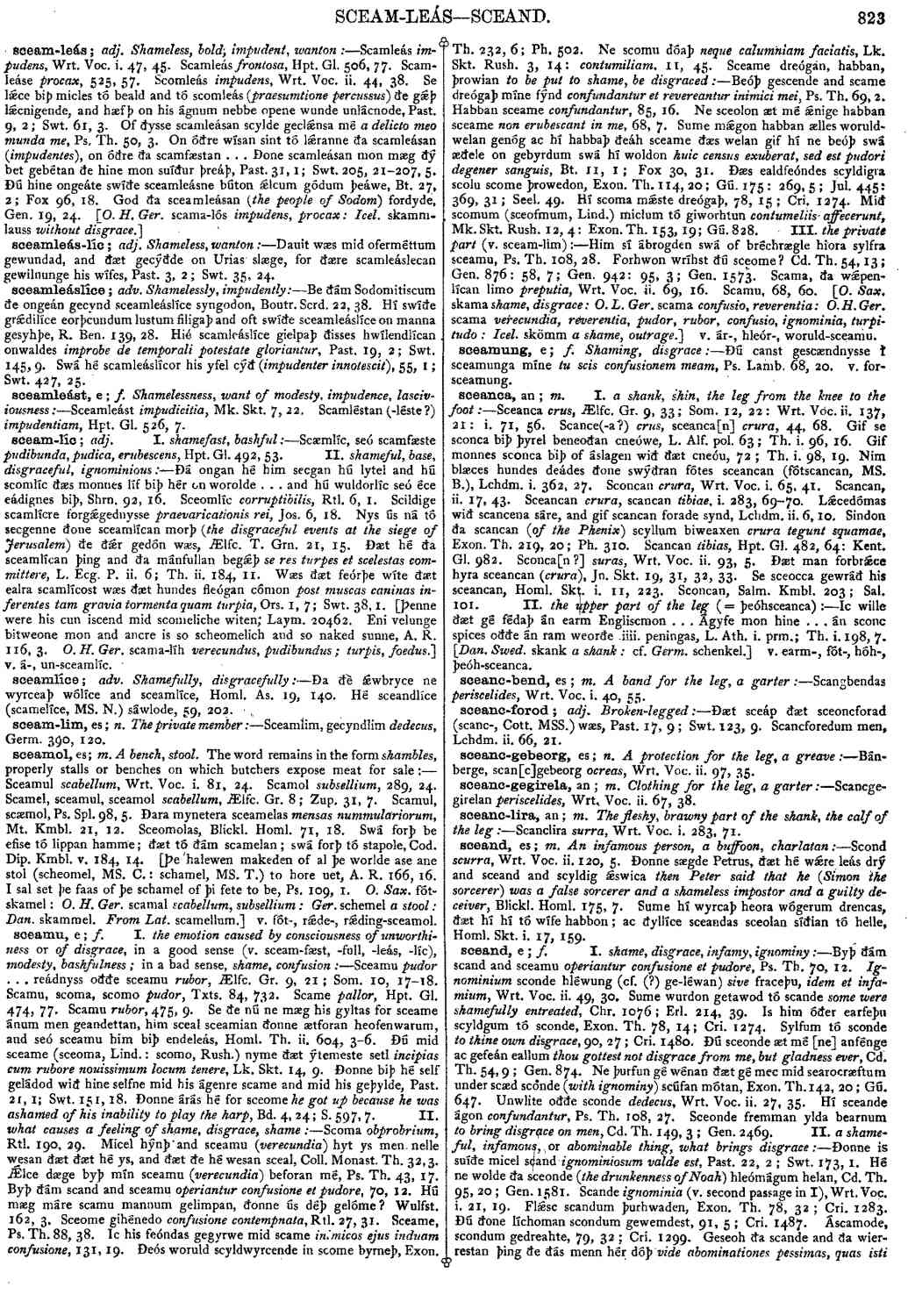sceamu
- noun [ feminine ]
-
Sceamu pudor . . . reádnyss oððe sceamu
rubor
,- Ælfc. Gr. 9, 21 ; Som. 10, 17-18.
-
Scamu, scoma, scomo
pudor
,- Txts. 84, 732.
-
Scame
pallor
,- Hpt. Gl. 474, 77.
-
Scamu
rubor
,- 475, 9.
- Se ðe nú ne mæg his gyltas for sceame ánum men geandettan, him sceal sceamian ðonne ætforan heofenwarum, and seó sceamu him biþ endeleás. Homl. Th. ii. 604, 3-6.
-
Ðú mid sceame (sceoma, Lind.: scomo. Rush. ) nyme ðæt ýtemeste setl
incipias cum rubore nouissimum locum tenere
,- Lk. Skt. 14, 9.
-
Ðonne biþ hé self geládod wið hine selfne mid his ágenre scame and mid his geþylde,
- Past. 21, I; Swt. 151, 18.
-
Ðonne árás hé for sceome
he got up because he was ashamed of his inability to play the harp
,- Bd. 4, 24; S. 597, 7.
-
Scoma
obprobrium
,- Rtl. 190, 29.
-
Micel hýnþ and sceamu (
verecundia) hyt ys men nelle wesan ðæt ðæt hé ys, and ðæt ðe hé wesan sceal, Coll. Monast. Th. 32, 3. -Ǽlce dæge byþ mín sceamu (verecundia )
beforan mé- Ps. Th. 43, 17.
-
Byþ ðám scand and sceamu
operiantur confusions et pudore
,- 70, 12.
- Hú mæg máre scamu mannum gelimpan, ðonne ús déþ gelóme? Wulfst. 162, 3.
-
Sceome gihénedo
confusione contempnata
,- Rtl. 27, 31.
-
Sceame,
- Ps. Th. 88, 38.
-
Ic his feóndas gegyrwe mid scame
in icos ejus induam confusione
,- 131, 19.
-
Ðeós woruld scyldwyrcende in scome byrneþ,
- Exon. Th. 232, 6; Ph. 502.
-
Ne scomu dóaþ neque calumniam faciatis, Lk. Skt. Rush. 3, 14:
contumiliam
,- 11, 45.
-
Sceame dreógán, habban, þrowian to be put to shame, be disgraced :-- Beóþ gescende and scame dreógaþ míne fýnd
confundantur et revereantur inimici mei
,- Ps. Th. 69, 2.
-
Habban sceame
confundantur
,- 85, 16.
-
Ne sceolon æt mé ǽnige habban sceame
non erubescant in me
,- 68, 7.
-
Sume mǽgon habban ælles woruld*-*welan genóg ac hí habbaþ ðeáh sceame ðæs welan gif hí ne beóþ swá æðele on gebyrdum swá hí woldon
huic census exuberat, sed est pudori degener sanguis
,- Bt. 11, 1; Fox 30, 31.
-
Ðæs ealdfeóndes scyldigra scolu scome þrowedon,
- Exon. Th. 114, 20; Gú. 175: 269, 5 ; Jul. 445: 369, 31; Seel. 49.
-
Hí scoma mǽste dreógaþ,
- 78, 15 ; Cri. 1274.
-
Mið scomum (sceofmum, Lind. ) miclum tó giworhtun
contumeliis affecerunt
,- Mk. Skt. Rush. la, 4: Exon. Th. 153, 19; Gú. 828.
-
Him sí ábrogden swá of bréchrægle hiora sylfra sceamu,
- Ps. Th. 108, 28.
-
Forhwon wríhst ðú sceome? Cd. Th. 54,
- 13; Gen. 876: 58, 7; Gen. 942: 95, 3; Gen. 1573.
-
Scama, ða wǽpen*-*lícan limo
preputia
,- Wrt. Voc. ii. 69, 16.
-
Scamu,
- 68, 60.
Bosworth, Joseph. “sceamu.” In An Anglo-Saxon Dictionary Online, edited by Thomas Northcote Toller, Christ Sean, and Ondřej Tichy. Prague: Faculty of Arts, Charles University, 2014. https://bosworthtoller.com/26561.
Checked: 0